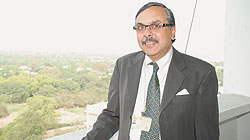What has been the feedback from delegates who attended the Pravasi Bharatiya Divas 2010?
The feed-back received from a vast majority of delegates at PBD 2010 was overwhelmingly positive. The two pre-conference seminars appear to have come in for wide appreciation as significant value additions. The live web-cast of the proceedings of the convention in an interactive mode was also a novel feature, which enabled many others who could not be present in New Delhi, to follow the proceedings and post their comments.
What are the key areas in which you think India’s engagement with its diaspora can be intensified?
There is good potential and promise in the areas of Global INK, IDF and in supporting diaspora’s efforts to preserve and nurture their rich cultural heritage.
 There are two diasporas, one that comprises the descendants of the older immigrants, and the other that is made up of the newer immigrants, mostly from the western world. The expectations of the two groups out of India are substantially different. How do you see the Ministry moving forward with them? There are two diasporas, one that comprises the descendants of the older immigrants, and the other that is made up of the newer immigrants, mostly from the western world. The expectations of the two groups out of India are substantially different. How do you see the Ministry moving forward with them?
Cultural-links, for instance is what our diaspora in ‘old immigrant countries’ would most like to preserve and nurture. Similarly there is need to correct their perception of India, especially the second generation Indians, whose ideas have been shaped by Western Media’s reporting of India-related events, in the ‘new immigrant countries’. We are working conscientiously at both areas.
One of the recently constituted bodies that will play a key role is the Global-INK. What are your own views on the functioning of this knowledge body?
Global INK will serve as a Knowledge transfer platform and will catalyse development of the knowledge, expertise and skills of Overseas Indians in India’s development effort. The Global INK is operational since January 1, 2010. The Global INK can be reached at
www.globalink.in.
Is there data to show that Overseas Indian investments in India, apart from the remittances, are on the rise?
No separate data is available for overseas Indians investment in India. However, actual investments made are monitored by the Department of Industrial Policy and Promotion
(DIPP).
Fuelled by India’s proactive engagements with the diaspora, there are growing numbers that are opting for OCI cards. Clearly, the intent is to have the door open for growth opportunities in India. Do you see specific plans for tapping into this pool of OIs? If so, how?
It is a fact that the demand for OCI cards is certainly rising. This Ministry certainly promotes greater engagement of Overseas Indians and has taken up several schemes to tap their potential. These include, Overseas Indian Facilitation Centre (OIFC), India Development Foundation (IDF) and the recently launched Global INK initiative.
OIFC is a key institution that should drive investments into India? Can you please let us know the kind of queries that the OIFC is generating, and in what kind of areas have investment flows started through the Centre?
During PBD-2010, OIFC launched an online portal developed by OIFC. The electronic portal comprises a series of online platforms such as an end-to-end information portal for updated information on sector and state specific investment opportunities and forthcoming events to invite diaspora’s participation, a comprehensive networking platform for communication and group formation needs to foster collaborations, an online business directory of verified Indian and diaspora businesses, a customized query and solutions platform and an investment tool-kit to ease the process of investing into India.
OIFC is generating queries in taxation and legal, healthcare, education, power and financial sector. OIFC is in the process of developing a mechanism to monitor the investment flows from Overseas Indians.
What is your vision for the MOIA?
This Ministry already has a vision and mandate for enhancing the engagement with the Diaspora and thereby supporting their initiatives for India’s development efforts. The second and extremely important area is migration management where we are introducing a new Migration Manangement Bill and also taking up initiatives of e-Governance in the area.
This is a time when relationships between India and Australia are not at their best. You would have had time to gauge how things will go from here on, especially with the students community that is in distress.
A number of steps have been taken by the Government of India to address issues relating to our students in Australia. The Government of Australia has also taken a number of steps which have proved useful. The two governments are closely in touch with each other and enjoy each others confidence. We hope to see an improvement in the problems faced by our students in Australia and more importantly a cessation of the exploitation of our youth by unscrupulous education/immigration agents.
|